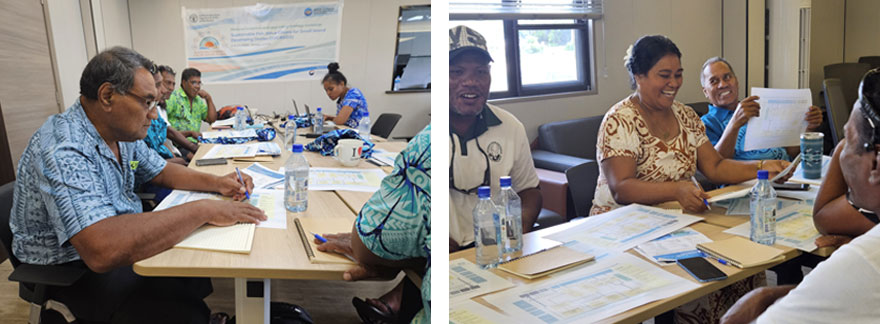Kiribati actors advance a 10-year strategy for a competitive domestic tuna value chain

“By 2033, Kiribati will contribute to supporting KV20 through the establishment of a competitive and reliable domestic tuna value chain with diversified products as a stepping-stone to international markets, acknowledging potential changes in the tuna resource due to climate change”. This vision, developed and endorsed by actors representing the tuna value chain in Kiribati, recognizes the importance of the tuna markets for income generation and food security in the country.
FAO’s Sustainable Fish Value Chains for Small Island Developing States (SVC4SIDS) project is assisting selected islands in Kiribati to improve and upgrade the performance of two value chains: lobster in Kiritimati, and domestic tuna in Tarawa, Makin and Nikunau.
A significant milestone in the SVC4SIDS project was marked by holding a “National inception and upgrading strategy” workshop on 4-5 July 2023 in Tarawa. The event gathered 30 participants from the 4 project sites including Mayors, Clerks and fishing community representatives, various divisions of the Ministry of Fisheries and Marine Resource Development (MFMRD), as well as the Tobwan Waara Programme, New Zealand Ministry of Foreign Aid and Trade, the World Bank and the Central Pacific Producers Limited (CPPL).
In his opening remarks, Mr Kihyun Kim, Director Asia and Pacific Division II, Republic of Korea’s Ministry of Foreign Affairs, shared that “FAO’s expertise and experience have proven to play an important role in driving positive change and promoting inclusive growth in many countries around the world”.
The workshop enabled fully engaging and constructive discussions whereby participants assessed and reflected on economic, social and environmental sustainability aspects pertinent to the domestic tuna value chain. Workshop participants also constructed a SWOT analysis for Tarawa and outer-islands, and the outcome of the discussion culminated in the endorsement of a 10-year vision that aspires to an efficient and well-functioning value chain.
In essence, the achievement of this shared vision requires upgrading and rehabilitation of fish centres in the project outer-islands namely Makin and Nikunau, sustainable harvesting and exploitation of the coastal tuna resource including deployment of Fish Aggregating Device (FAD). Furthermore, market diversification as well as improved quality and shelf life of tuna products are key elements for the achievement of the collectively adopted vision.


